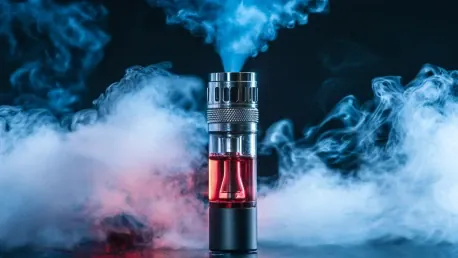The UK’s Advertising Standards Authority (ASA) recently made headlines with its groundbreaking ruling on the promotion of nicotine-containing e-cigarettes through affiliate marketing channels. This decision specifically targeted Pixus Online Ltd, a company operating under the trade name Juicemate, for violating advertising laws. The ruling has far-reaching implications that extend into the very fabric of the vaping industry’s marketing tactics. It emphasizes strict adherence to regulations, ensuring that there are no loopholes exploited by brands through their affiliate marketing programs.
Regulatory Clarity and Legal Implications
Affiliate Marketing: No Longer a Loophole
For years, many vaping companies have relied on affiliate marketing as a way to circumvent stringent advertising laws. However, the ASA’s ruling unequivocally states that affiliate marketing does not provide an escape from legal responsibilities. Juicemate’s case was central to this ruling because the company was found indirectly promoting unlicensed nicotine-containing e-cigarettes via their affiliate program. This means both brands and affiliates are held legally accountable for illegal promotions, marking a significant shift in how regulations will be enforced moving forward.
Affiliate marketers have often operated in a gray area, assuming that promoting products indirectly could potentially protect them from the severe scrutiny applied to direct advertising. The ASA’s recent decision makes it clear that this is no longer the case. Affiliates who choose to promote restricted products without ensuring compliance can face legal repercussions. This new stance necessitates a reevaluation of existing and future marketing strategies within the vaping industry, as both brands and their marketing partners must prioritize compliance over mere promotional reach.
Unlicensed Promotions and Legal Risks
The ruling puts a spotlight on the CAP Code rule 22.12, which explicitly prohibits the marketing of nicotine-containing e-cigarettes that are not licensed as medicines, even through indirect means such as affiliate marketing. This increased level of scrutiny, aimed at protecting public health, means that companies can no longer plead ignorance if their affiliates promote unlicensed products illegally. It serves as a wake-up call for all stakeholders to ensure that their promotional activities are compliant with existing laws to avoid hefty fines and other penalties.
Given that the ASA’s focus is on ensuring that public health standards are met, the consequences for promoting unlicensed e-cigarettes extend beyond legal implications. It is a matter of public safety, with the ultimate goal of reducing the spread of nicotine products that have not undergone rigorous medical testing and approval. Companies involved in the production and sale of these products must now navigate a landscape that demands more transparency and accountability in their marketing endeavors, with a serious emphasis on obtaining the necessary licenses before engaging in any promotional activities.
Industry Impact and Necessary Adjustments
Immediate Measures for Compliance
The ASA’s ruling requires immediate action from vaping brands and their affiliates to dismantle any non-compliant affiliate marketing programs. Businesses must take proactive steps to audit current affiliate relationships, ensuring that no unlicensed promotions are being conducted. Legal guidance is highly recommended for companies unsure about their compliance status. This proactive approach will help avoid any legal ramifications and ensure future marketing campaigns adhere to new and existing regulations.
This decision has created a need for a significant shift in the operational dynamics of vaping brands. By conducting thorough audits, companies can identify potential areas of non-compliance and take corrective actions. Additionally, seeking legal advice provides a layer of security, ensuring that marketing strategies align with regulatory standards. The industry must recognize the importance of staying ahead of regulatory changes and adapt swiftly to new compliance requirements to minimize risks and safeguard their continued operations.
Future Marketing Landscape
The enforcement trend seen in the ASA’s ruling signals an era of intense regulatory scrutiny on the vaping industry’s performance marketing. Brands and their affiliates must now invest in compliant, transparent marketing practices. This shift may lead to more innovation in how vape products are marketed effectively yet legally, ensuring that consumer safety and public health remain at the forefront of all promotional activities.
Companies are expected to explore creative avenues that align with legal requirements while still engaging consumers effectively. This could include leveraging educational campaigns, focusing on the benefits of quitting traditional cigarettes, or highlighting products that have undergone rigorous medical testing and approval. The ruling underscores the need for the industry to evolve, emphasizing responsible marketing practices that do not compromise legal standards or public health. This adaptive approach will not only bolster compliance but also build trust with regulators and consumers alike.
Conclusion
The UK’s Advertising Standards Authority (ASA) recently made headlines with a groundbreaking ruling concerning the promotion of nicotine-containing e-cigarettes via affiliate marketing channels. This landmark decision specifically targeted Pixus Online Ltd, which operates under the trade name Juicemate, for breaching advertising laws. By taking this stand, the ASA has sent a clear message to the vaping industry about the importance of obeying advertising regulations.
This decision emphasizes the need for stringent compliance and leaves no room for brands to exploit loopholes. The landmark ruling highlights the ASA’s commitment to ensuring that all marketing practices for nicotine-containing e-cigarettes are thoroughly regulated and transparent. The implication goes beyond just the company involved, potentially transforming the way the entire vaping industry approaches its marketing strategies. This case serves as a reminder for all businesses in the sector to scrutinize their promotional tactics and ensure they meet regulatory standards to avoid similar penalties.









